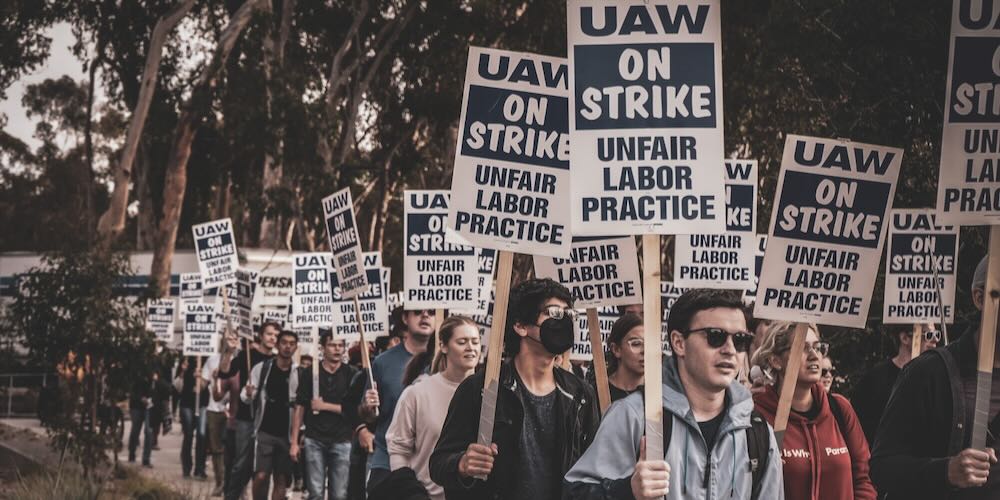The Three Ahmaris and the UAW
If one thought there was a general problem of “the relation of labor to capital” and one wanted to find contemporary lessons, presumably the place to look right now would be the current UAW strikes. The standoff looks to be a mess. Most onlookers are perplexed as to the best way out.
Recast the question: Suppose one were to bring to bear the analysis offered by Sohrab Ahmari in his recent book, Tyranny, Inc. After all, the book was originally intended to advise political parties on how they might be “the party of the working class.” What insights would it contribute?
Its overall lesson, Ahmari tells us, is that “a failure to subject the market to sufficient political control and democratic give-and-take has imperiled the livelihoods of millions of ordinary Americans while damaging our economy and the common good.” Yet I find that this general lesson takes three different forms in the book. Accordingly, I will refer to them as the “Three Ahmaris.”
First, there is the anti-Reagan Ahmari, who holds in effect this:
The New Deal ushered in several post-war “glorious decades” of a growing and prosperous middle class. But the New Deal was unraveled by Ronald Reagan in the 1980s, because of his “libertarianism”—that is, his concern to deregulate the economy and unleash market forces, to the benefit of wealth creators. But this change led directly to viewing workers as consumers not producers, and the disaffection of workers. The only path forward, for the Republican Party, is to reclaim those voters by becoming the party of the working class, which means to take their side instinctively, keenly pursuing industrial policy, protectionism, and restrictions on immigration.
Here, “libertarianism” means de-regulation and (in Britain mainly) privatization.
This first Ahmari’s analysis is itself implausible. It ignores the dependence of America’s post-war success on a baby boom, and the fact that we won the largest war in history, in which all our economic competitors were weakened or destroyed. It ignores the truth that America’s prosperous middle class depended on stable marriages, and births within such marriages, and that these started to unravel well before Reagan. And how could Reagan have dismantled the New Deal, when he couldn’t even abolish the Department of Education?
Moreover, the analysis seems to give the wrong advice as regards the UAW standoff. The erosion in auto workers’ wages is a result not of “private tyranny” but of the inflationary policies of the Biden administration. And workers’ admittedly “precarious” position is the effect not of “the market” but of the Biden administration industrial policy favoring electric vehicles: Ford lost $60,000 for each EV made in the first quarter of this year.
In short, “libertarianism” is certainly not the source of the workers’ problems, while those acting on instincts like Ahmari’s have hurt these workers.
The second Ahmari is the anti-capitalist Ahmari, who holds, in effect:
The central injustice in a political economy is the original unbalance between capital and labor. The New Deal put them into balance. But that balance was upset by Reagan because of his “libertarianism”—that is, his vaunting of the ideology of Milton Friedman, that a worker who “sells” his labor to his employer is just as free to find another purchaser, if he wishes, as the employer is to “buy” the labor of another employee. The correct path forward is to correct the imbalance with an even larger administrative state, more regulation, and government assistance of organized labor.
For this second Ahmari, “libertarianism” now means that owners, because they are owners, enjoy an initial presumption to hire and fire workers as they see fit.
Sound analysis in political economy requires a balanced account of every relevant type of major human failure and every perverse incentive. Otherwise one is at risk of proposing a solution that makes matters worse, or replaces a bad scenario with another which is much worse. Certainly at will employees are often in a vulnerable position. It is true as well that managers do not always treat layoffs as a recourse of last resort to cut costs. But Ahmari’s favored solutions cannot eliminate these problems. At the same time, they would accelerate government’s crowding out of civil society, and imply an even faster growth in the national debt and the tax burden, while diverting needed attention from problems in family life, schooling, and culture.
As for organized labor, how much of the apparently hot-headed leadership of UAW President, Shawn Fain, was made politically necessary by years of kickbacks, bribery schemes, and embezzlement among UAW leadership? (“United Auto Workers Seek to Shed a Legacy of Corruption,” reads a typical headline from last summer.) The Federal government in recent years has had to be “assisting” the UAW mainly by indicting and imprisoning its leadership.
At the same time, workers in non-union auto shops seem to be better situated and not inclined to unionize.
Finally, there is a third, anti-liberal Ahmari, who holds, in effect:
The New Deal fostered a sense of solidarity in our society, because it emphasized the common good while deliberately sidelining concerns over limited government and individual liberty. Reagan with his “libertarianism”—that is, his exalting of limitless choice among limitless options—led to the undermining of the common good. Reagan gave free rein for people selfishly to prefer the “expressive self” or “erotic self” or “the autonomous individual” over the common good. The only path forward is to reject decisively “liberalism” and any preoccupation with individual liberty.
For the third Ahmari, “libertarianism” means a self-understanding, and an ethic, that recognizes no commitments “in nature.” All commitments are by convention solely, as a result of prior agreement. But to confuse this view with what James Wilson called “the system of natural liberties”—as the “post-liberals” tend to do—is a most serious, and self-defeating mistake.
As for the common good, in classical theory, the common good was that citizens be virtuous. (Remember “Making Men Moral”?) The growth of government seems inversely related now to such a goal. However, as the common good is defined by the reigning standard today—that is, by global climate change ideology—workers who make vehicles powered by fossil fuels are like collaborators in a project grossly harmful to the common good. They are akin to cigarette or asbestos-producing companies. It would be best for the common good, so understood, if these auto plants in Michigan just folded up and went away.
Needless to say, neither does this third Ahmari shed light on the UAW standoff.
But it amounts to the same thing, to say that Ahmari’s analyses shed no light on the present situation, and to say that the standoff gives no support to any of Ahmari’s analyses.
What about the examples he supplies in the book? Surely in documenting “the Political Economy of Dystopia,” as he calls it, Ahmari offers some justification for his rejection of “libertarianism”?
Like most everything else, people take different sides on the matter because there is a trade-off.
Actually, no. Consider his treatment of “just in time” (JIT) scheduling, where workers (say, in a restaurant) volunteer to take shifts, or are assigned them, only at the beginning of each week, when the need for hours looks clearer to the manager. Ahmari tells the story of Alicia Fleming, who after years in the restaurant service profession had a baby at 35 and could not continue to work at her job if her hours were unpredictable on account of JIT scheduling. For Ahmari, it’s a story of how she “and countless others of the kind … have lost many of the political gains they made in the twentieth century.”
But “just in time” management was first developed in Japan in manufacturing after WWII, and quickly imitated by the US and other countries in manufacturing. Only in the last couple of decades was it applied widely in the service sector. The New Deal never prohibited it; its rise has nothing to do with Reaganism or libertarianism.
Like most everything else, people take different sides on the matter because there is a trade-off. Many workers appreciate not being on site when they are not needed—it gives them more free time. Moreover, they like to work as a team towards the success of a restaurant, and greater efficiency can mean a more secure business down the road. At the same time, many managers are moving away from it because it can lead to high turnover. Ahmari says nothing about a trade-off, as it would not fit into any of his stories. JIT scheduling is private tyranny, period.
Oddly, in his discussion of the case, Ahmari implicitly adopts the viewpoint of the “autonomous individual,” which he attacks elsewhere as misguided “libertarianism.” Where did Alicia Fleming’s baby come from? Who was the father? Why doesn’t he help her raise the child? Where is her extended family? Shouldn’t the extended family be a buffer against “private tyranny”? Suppose a woman chose to have three babies over three years from three different men—what exactly would be an employer’s responsibility to her, if we don’t, after all, treat her as an autonomous individual (and yet, as Ahmari does in his analysis)?
So this hand-picked example supports none of the three Ahmaris. In particular, JIT scheduling is not a case of a New Deal settlement getting overturned by Reagan-era “libertarianism.”
Next, consider the case of a couple, the Purcells, whose trailer park home burned down in 2013, after which they were served with a surprise $19K bill by a private firefighting firm, Rural/Metro (owned by Warburg Pincus), which came to the fire even though the family had not called for them. Ahmari’s gloss is “the family thus joined the growing ranks of Americans who thought of firefighting, ambulances, and other emergency services as common goods, funded by the community and supplied by the government, only to get a rude awakening when Big Finance came collecting.”
But Rural/Metro was founded in 1948 to provide “fire protection and emergency medical services …primarily under a subscription-based model,” as Wikipedia tells us. Sometimes municipalities also contract with them. Rural/Metro has long existed to supplement or stand in for emergency services in sparsely populated areas. Its founding had nothing to do with Reaganism. The New Deal did not (foolishly) attempt to rule out similar companies, which have provided a needed stopgap or supplement. A subscription model does foster a common good; insurance is one of the original forms of a common good.
Rural/Metro’s bill was not exploitative. It looks large at first but makes sense if one assumes, as did the firm, that a trip to a trailer park in a fairly remote location should cost $1500 per truck per hour and $150 per firefighter per hour.
Moreover, in this example as in others, Ahmari does not investigate beyond his source story (in this case, from the Huffington Post) and ask such questions as: Were the Purcells negligent in the outbreak of the fire? Did the fire put their neighbors and neighbors’ homes at risk? Why did the Purcells not pay the $474 subscription fee for the service (an insurance premium)—freeloading—when many neighbors were paying? It seems plausible that a municipality might support the serving of a bill against someone who looks to be taking the risk of a free rider. It’s not unlike how backpackers who take unreasonable risks are served large bills for the assistance of mountain rescue.
This example, then, also gives no support to the narratives of any of the three Ahmaris.
And then there’s the case of Stephen Morris, the newly-hired CPA in training at Ernst & Young, a big four firm. In 2005 he was upset that he was not being paid overtime when he clocked many extra hours per week during the “busy season” for accountants (Jan 1 through Apr 15). For Ahmari, this is a clear case of “illegal underpayment” of wages, which, he warns us, is one of the grave sins that “cry to heaven” for vengeance.
Yet Ahmari does not tell his readers that overtime pay was first mandated in 1938 by the Fair Labor Standards Act (FLSA). But the FLSA explicitly exempted anyone serving in an “executive, administrative, or professional role,” such as Morris. So, the New Deal itself denied that professionals like Morris deserved overtime pay.
Therefore, on its substance, nothing in this case supports any of Ahmari’s narratives. Both by natural law (which presumably recognizes nothing unjust in a professional’s working long hours in a time of urgency—Morris was paid handsomely, after all!), and by the FLSA, the relevant Federal law, there are no unpaid “wages crying out to heaven.”
Nor is there even a clear case of “private tyranny,” since the “busy season” is entirely a creature of government. Ahmari does not often take an additional step of inference to look at what Frédéric Bastiat would call “unseen causes.” But it is because of the complex tax code of the IRS; the filing requirements imposed by the SEC; and the SEC’s requirement that firms of public accountants audit the financials of public companies, that professionals like Morris need to work up to 80 hours per week in those three months.
Although Ahmari ends his chapter on the Morris case with a preachy attack (against Justice Scalia) about wages crying to heaven, he mainly discusses not the substance of Morris’s claim, but rather the derivative legal issue of whether, in agreeing to have disputes with the firm settled by arbitration, Morris had signed away any right to band together with other junior accountants like himself and sue Ernst & Young in a class action lawsuit.
One might paraphrase Kant and say, if “theories without cases are empty, and cases without theories are blind”—then it is a book, which is half empty, half blind.
This legal question (about the proper interpretation of the Federal Arbitration Act) went all the way to the Supreme Court and was settled in 2018. Justice Gorsuch, writing for the Court, sided with Ernst & Young, in an opinion that had nothing to do with any kind of libertarianism. Rather, the most important precedents for the case were from the Warren Court (Prima Paint, 1967)—an activist court paying scant attention to the requirements of Federalism—and then, later, two cases where the sole Reagan appointee on the Court, Justice Sandra Day O’Connor, sharply dissented (Moses H. Cone, 1983, and Southland Corp, 1984)!
That is to say, nothing in the Morris case—neither the fact that as a professional he was not compensated for overtime work, nor SCOTUS’s holding that, because he had signed an arbitration agreement, he was denied recourse to a class action lawsuit—in any way supports any of the three Ahmaris.
One can go on and on—Ahmari’s chapter on towns that outsource public services, but in which he never asks why towns consider it wise to do so or why those local governments aren’t ultimately responsible for mistakes (rather than their private counterparties); and in which he gives no evidence that such outsourcing is a function of the grip of “libertarian ideology” over local politicians.
Or his chapter on the demise of the local newspaper (“Parched for Truth”), which focuses on “Silicon Valley monopolists and Wall Street looters” as responsible for that change, instead of smartphones and tablets.
Or his chapter on bankruptcies, which shows not even the slightest skepticism towards class action claims against J&J for its baby powder, or towards the motives of class action plaintiffs, or the benefits for the represented class, or whether such lawsuits, in general, serve the common good.
Tyranny, Inc., in short, is a book of cases looking for a theory, and of theories still in search of cases. One might paraphrase Kant and say, if “theories without cases are empty, and cases without theories are blind”—then it is a book, which is half empty, half blind.
It is not surprising, then, but predictable that when one turns to the UAW dispute, the three Ahmaris turn up empty-handed once more.



